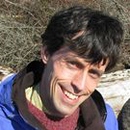Academic Editors
The following people constitute the Editorial Board of Academic Editors for PeerJ. These active academics are the Editors who seek peer reviewers, evaluate their responses, and make editorial decisions on each submission to the journal. Learn more about becoming an Editor.

Daniel Erasmus
I am an Associate Professor in the Department of Chemistry and Biochemistry at the University of Northern British Columbia. My research focuses on using molecular biology, chemical, and ecological analysis tools to characterize and understand the interactions between macro-invertebrates and fish.

A. Murat Eren
I am a computer scientist and a microbial ecologist. I develop algorithms and software platforms to make sense of the ecology of microbes through marker genes, metagenomes, and metatranscriptomes.

Alexander Ereskovsky
I am an invertebrate embryologist, and my main areas of interest are different topics of sponges regeneration, embryonic, postembryonic development and the evolution of sponge’s morphogenesis. I'm also interested in the sponge’s biodiversity, taxonomy and phylogeny. I am currently a Senior Researcher at French National Centre for Scientific Research in Marseille and Professor in St-Petersburg State University in Russia
Offer Erez
Professor, Director of maternity "D" Department and Obstetrical Day care Center , Soroka University Medical Center,Faculty of Health Science, Ben Gurion University of The Negev, Israel. Research Areas: Hypertension In Pregnancy, Coagulation and Hemostasis In Normal and Complicated Pregnancies, Preterm Labor, preterm PROM, IUGR, Stillbirth.
The Development of therapeutic modalities in the field of preterm labor and preeclampsia.

Jason Ernst
Jason joined the faculty at UCLA in the Department of Biological Chemistry, the Computer Science Department, and the Bioinformatics Program in 2012. Prior to that, he was a postdoctoral fellow in Manolis Kellis' Computational Biology Group in the Computer Science and Artificial Intelligence Laboratory at MIT and affiliated with the Broad Institute. In 2008, Jason completed a PhD advised by Ziv Bar-Joseph where he was part of the Systems Biology Group, Machine Learning Department, and School of Computer Science at Carnegie Mellon University. Jason also earned BS degrees in Computer Science and Mathematics from the University of Maryland College Park. He is a member of the editorial board at Genome Research and has been a program co-chair for the ISMB Regulatory Genomics Special Interest Group (RegGenSIG) meeting. He is a recipient of a Sloan Fellowship, NSF Career Award, NSF Postdoctoral Fellowship, a Siebel Scholarship, and a Goldwater Scholarship.

Géraldine Escriva-Boulley
Dr. Géraldine Escriva-Boulley is an associate professor at Haute-Alsace University in France.
Her specific areas of research include Social Psychology and Positive Psychology.

Marcial Escudero
Assistant Professor of Plant Biology and Ecology, University of Seville (Spain). Past postdoctoral researcher at Doñana Biological Station (CSIC, Seville, Spain), at the Field Museum of Natural History of Chicago (Illionois, USA) and at The Morton Arboretum (Lisle, Illinois, USA). Past PhD student at University Pablo de Olavide (Seville, Spain).

Mário C Espada
Dr. Mário Espada is Adjunct Professor at the Instituto Politécnico de Setúbal, teaching in Higher Education School (ESE-IPS) and Higher School of Health (ESS-IPS).
He carried out his Postdoctoral in Human Kinetics, Sport Sciences specialty in 2015 at the Universidade Estadual Paulista (UNESP, São Paulo - Brazil), and earned his PhD in Human Kinetics, Sport Sciences in 2013 within the Faculty of Human Kinetics, University of Lisbon, Portugal (FMH-UL).
Dr. Espada also holds the following roles:
Effective member of Sport Physical Activity and Health Research & Innovation Center (SPRINT).
Collaborating member of Interdisciplinary Centre for the Study of Human Performance (CIPER), Faculty of Human Kinetics of the University of Lisbon, Portugal (FMH-UL), Comprehesive Health Research Centre (CHRC), University of Évora, Portugal (UE), and Life Quality Research Center (CIEQV).
Dr. Espada has published several articles in specialized journals. Regular presence and presentation of communications in international technical and scientific events.
His primary research areas are Sport and Exercise, focusing in Exercise Physiology and Training Methodology.

María Ángeles Esteban
Professor of Cell Biology in the Cell Biology & Histology Department, Faculty of Biology, Murcia University. She is the head of the research team "Immunobiology for Aquaculture" working on fish species of interest for aquaculture. She has been Vice-chancellor of the University of Murcia and she is the actual director of the Department of Cell Biology & Histology at the University of Murcia.

Shahroo Etemad-Moghadam
Associate Professor at Dental Research Center, Tehran University of Medical Sciences.
DDS, MS, Observer at the Armed Forces Institute of Pathology (AFIP), Washington D.C.
Associate Editor/Editorial Board: Frontiers in Dentistry, BMC Cancer.
Research Interests: Oral and Maxillofacial Pathology, Angiogenesis, Odontogenic Benign and Malignant Lesions, Cellular and Molecular interactions in Cancer

Rudi H. Ettrich
Rudi received his prediploma in chemistry (Vordiplom) from Eberhard-Karls-University, Tuebingen, Germany, in 1993, his Master of sciences (Mgr.) in physical and macromolecular chemistry from Charles University, Prague, in 1998 and his PhD. in physical chemistry from Charles University, Prague, in 2002.
Since 2013 he is a full Professor (Prof.) in biophysics and currently acts as the President/CEO of Larkin University, Miami, FL and holds a faculty appointment at the College of Biomedical Sciences. He also holds community-based adjunct faculty positions at the Wertheim College of Medicine, Florida International University, Miami, FL, and the Department of Mathematics and Physics, Charles University, Czechia.
Prior to joining Larkin University Rudi was affiliated with the Czech Academy of Sciences, where he acted as director, group leader and senior researcher at the Center for Nanobiology and Structural Biology of the Institute of Microbiology in Nové Hrady, Academy of Sciences of the Czech Republic
Rudi's research is focused on the relationship between structure and function of proteins, dynamic changes related to functional processes on the level of proteins and the mutual interaction of cofactors and subunits in protein complexes. The research approach is very complex using various methods of protein research with a synthesis of theoretical and experimental methods.

Jay D Evans
Lead Scientist for the US Dept. Agriculture Bee Research Laboratory. Recipient of 2011 Hambleton Award for Bee Research and 2002 ARS Early Career Scientist-BA Award, member i5k Insect Genome Planning Committee.

